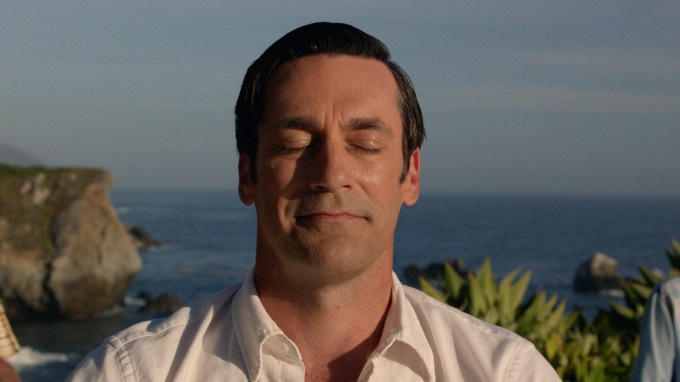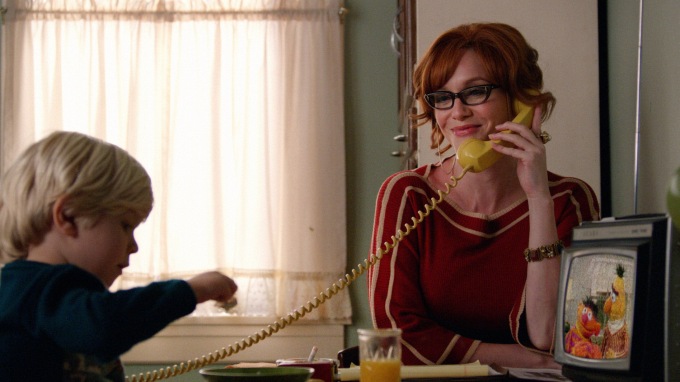Here’s my conversation with Devin Mitchell about “Person to Person,” the series finale of Mad Men.
Mark: Before we start our deep dive into “Person to Person,” the series finale of Mad Men, let’s get a few caveats out of the way. Here are mine:
- Regardless of my positive or negative reactions to this episode of television, I love and respect Mad Men, and I’m very sad it’s over.
- There are no right answers. Even if Matthew Weiner were to give twelve interviews today explaining all of his decisions, what’s onscreen is up to each viewer’s interpretation.
- I don’t like Coke. Or drink soda, ever.
Devin, feel free to add any of your own caveats to my list. Before you do, I’ll offer some insight into my first reactions at the end of last night’s episode. I was moved to tears several times. I laughed out loud four or five times, sometimes at a funny line of dialogue, sometimes at the prospect of the show ending in twenty — no, fifteen! — minutes. I definitely laughed at the Coke ad, though I wasn’t sure why and I’m still not.
The key takeaway is that nearly all of my reactions to this ambiguous, unusual episode of television were emotional. The intellectual responses came later, especially when I logged onto Twitter. But for a few moments, I was happy to care only about how the episode made me feel, not what it was trying to say.
Your turn, Devin. What were your visceral reactions to the finale? And where do you want to begin discussing specifics?
Devin: The only caveat I would add is that it’s very difficult for any show to do a series finale that satisfies all viewers, especially for a prestige drama like Mad Men.
I also just want to say it didn’t even occur to me initially that Don could have written the Coke ad. Shows you perceptive I am.
My visceral reaction was sadness that this was the last time I would be sitting down to watch a new episode of Mad Men, but also a little bit of disappointment that it wasn’t an all-time great episode of the show that put to rest my doubts about splitting the final season into two halves.
That said, I really enjoyed parts of it. All the phone calls that gave the episode its title were very well done. Jon Hamm’s performance during Don’s phone call with Peggy was amazing. Peggy’s reaction to Stan’s declaration of love was so funny. It was if anything, surprisingly upbeat for most of the characters we saw in that final montage.
I realize I have veered into specifics here, but what did you think of some of those developments?
Mark: It didn’t immediately occur to me that Don wrote the Coke ad either. I think our reaction and lack of recognition is telling, actually. If Matthew Weiner really wanted us to know for certain that Don wrote the ad, he would have showed Don writing the ad. He didn’t. The two images are linked by a cut, igniting speculation, but there’s nothing in the text that will confirm or deny Don’s involvement in the ad. Not even these (courtesy of David Clinch on Twitter).
The real question is what different readings of those final moments tell us about the ten-year odyssey of Don Draper that Mad Men chronicles. I confess I don’t have the answers yet. I’d like to believe that something broke in Don when he heard Leonard talking about his comprehensive loneliness, but it’s just as likely that Don only believed thought or acted like he’d had a breakthrough when really he was primed to retreat to his old ways. Jon Hamm’s performance, as you say, is exceptional throughout this episode (and the entire run of the show). In concert with Weiner, Hamm never fully lets you inside Don’s head. We’ll spend the next few days, months or even years trying to claw our way in.
So many phone calls in an episode called “Person to Person.” I love that – typical on-the-nose Mad Men. And yet, the subtext is rich. The entire series has been about the difficulty of connecting to another person, whether it’s someone you accidentally killed in battle or your new boss. And the telephone acts as the slippery intermediary in those exchanges. It giveth as easily as it taketh away. For instance, maybe Don would have been more inclined to commit to his children if he had seen Betty’s face as she told him her custody plan (and how great was January Jones in that scene? Very great). But without the phone, Stan might have been too blinded by the rage he feels when he looks at Peggy’s face to realize that he’s been in love with her for years.
I agree that that scene was hilarious. It also made me tear up. As much praise as has been handed to Elisabeth Moss over the years, I don’t really feel like it’s enough. Her delivery of “What?” after hearing Stan’s declaration should be in a museum. I was a little surprised at the degree to which that moment felt like an unadulterated fairytale triumph, which isn’t usually in the Mad Men wheelhouse. But in the long view, seeing Peggy go from Joan’s punchline in the pilot to a professional force in the finale made her romantic victory seem like a personal triumph. And if anyone on Mad Men deserved one of those, it had to be Peggy.
Did you think the fairly upbeat endings in the closing montage were earned? Did you feel like those endings were as happy as they appeared to be? And did you think to yourself in the opening seconds of the finale that Weiner was slyly nodding to “Mad Max” with the shots of Don Draper speeding through the desert?
Devin: I thought it was notable that the Twitter accounts for both McCann and Coca-Cola both attributed the idea to Don (in the show that is; obviously real people came up with the ad). The Esalen Institute where Don was staying does resemble the setting for “I’d Like to Buy the World a Coke.” But ultimately you’re right – it’s somewhat ambiguous. I wonder if Weiner will say anything about that part of the finale.
It’s a little frustrating to me that so much of the finale discussion has focused so heavily on this narrow point. But ultimately it does determine the entire trajectory of Don’s character in a sense. Does he finally make a fundamental change to his destructive lifestyle or is this epiphany only temporary?
The best case, in my view, for him returning to create the ad, is his past behavior, not comparing screenshots. His words to Peggy, particularly “scandalized my children,” were a deeper admission than anything we’ve seen from before. But Don has had so many supposed new beginnings and realizations that precede a return to disgraceful behavior that it would be just like him to channel his California experience into his next idea. Remember when marrying Megan was going to redeem him? And as Dan Fienberg noted in his piece on the finale, does Don have a place that feels like more of a home than Madison Avenue?
I’m normally hesitant for couples on television to declare love for each other suddenly, but Stan and Peggy felt so earned. I’m still thinking about their beautiful scene together from “Time & Life.” It was atypically triumphant for Mad Men to give these characters such a happy ending, but after all the adversity Peggy has faced, I think she deserves it.
I actually thought the Peggy-Joan partnership would have been more of an out-of-character fan wish fulfillment. Those two have always sort of been on slightly different wavelengths even as they were often the only two women in a male world, so it would’ve been a little too neat for them to go into business. Though I confess to 1) loving the sound of “Harris Olsen” and 2) thinking Peggy’s talents are wasted on advertising.
As for the happy endings, only Peggy, Stan, and Betty appeared fully at peace to me. Joan is professionally successful but still hasn’t found love. Don is a total wild card. How long will Roger and Marie and Pete and Trudy really last? My feeling is that Mad Men happened to end at a upbeat moment for many rather than permanent happiness.
I actually thought of Breaking Bad before Mad Max when Don was in the desert!
Mark: All good points, Devin. I completely agree that Harris Olsen would have been a cheat based on what we knew about those characters and their complicated relationship. Alyssa Rosenberg has a good analysis of Joan and Peggy’s relative accomplishments. It’d be easy to watch this finale and think that they vanquished the patriarchy once and for all, but in reality they learned to live within it, subverting it in subtle ways.
I think we all want to believe that Don found something deep within himself during his time at Big Sur, but you’re probably right that the only thing he found was the thing he’d had all along: prime salesmanship. I’m still uncomfortable with definitively saying Don came up with the Coke ad, but I’m even more uncomfortable with believing that placing it right after Don’s moment of spiritualism on the cliff was a total coincidence or merely a thematic tie-in.
But therein lies the beauty of Mad Men. To an extent, it was what you made of it. If you wanted to appreciate it for surface pleasures only, this finale was rewarding, though not on the level of the show’s finest episodes. If you wanted to dig deeper into the show’s symbolism and intellectual ambitions, the material is there. And if you want to imagine the show as a statement on the shallowness of the 60s or the shamelessness of advertising or the challenges of empathetic relationships or the corruption of war, that’s your reading and everyone else has theirs too. The best TV shows present you with ideas and let you untangle them. Mad Men embraced that idea more than any show I’ve ever seen. I’ll miss it.
Any closing remarks, Devin? We should revisit the finale and/or the show at some point. I still think day-after judgments have their limitations.
Devin: Mad Men has always been a show that’s open to interpretation, so it’s fitting that it would end that way. Mark, I agree it’s not definitive either way re: the Coke ad.
Evaluating Mad Men as a whole is a longer discussion, but what kept bringing me back was the characters who remained compelling even as they behaved in frequently infuriating ways. The show definitely has its flaws and blind spots, but its ability to depict change over time with such attention to detail is something I’m not sure we’ll see matched again soon on TV.
But I’d love to revisit this episode, the half-season, and the series as a whole in more detail later. I’m still forming my thoughts on it.





